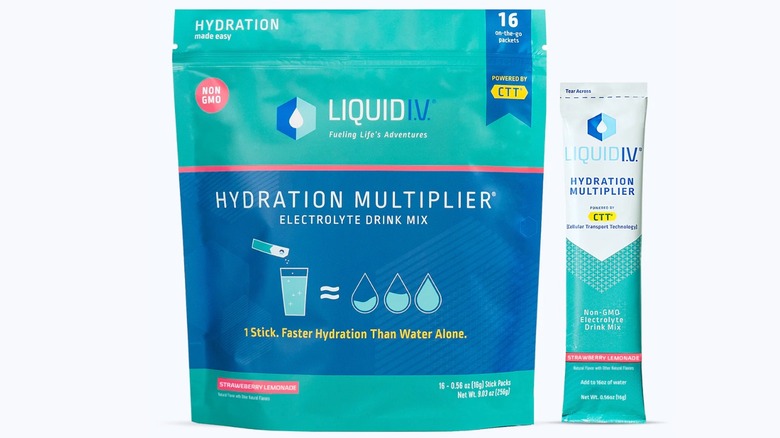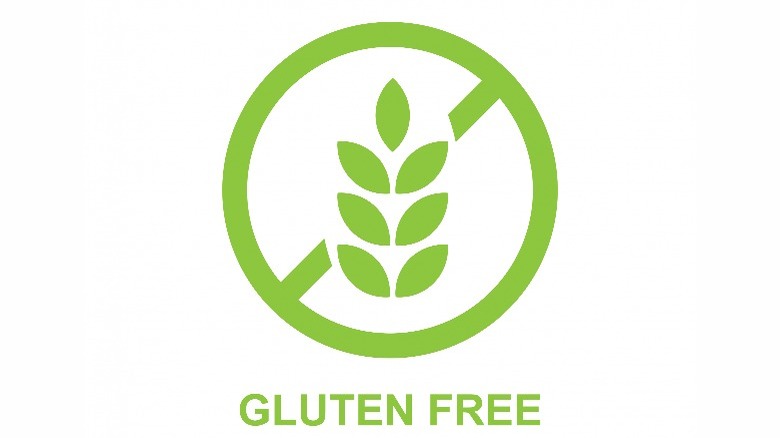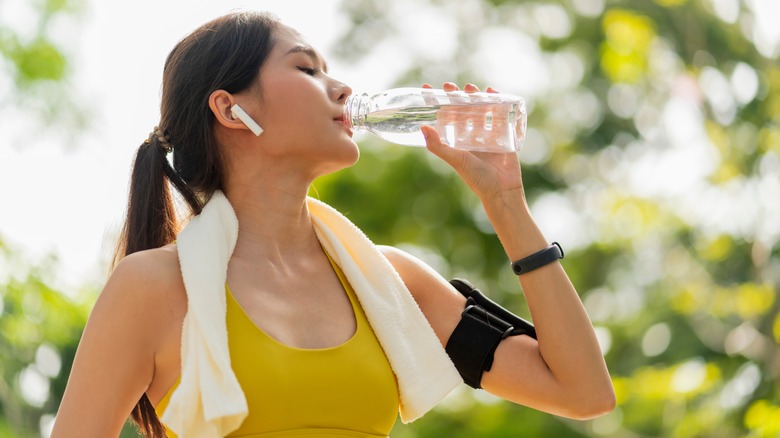The Gluten Controversy Surrounding Liquid IV Hydration Packets
Among the growing list of brands competing with the OG — Gatorade — is Liquid I.V., claiming that its proprietary electrolyte drink mix is absorbed into the bloodstream faster than drinking water alone. According to its website, the self-proclaimed "#1 Powdered Hydration Brand in America" reports secondary benefits like reducing signs of aging, increased mental clarity, more energy, and burning more calories. However, what the company asserts its product lacks has them surrounded by controversy.
Owned by Unilever, Liquid I.V.'s nutrition label reports that the product is free of GMOs, gluten, soy, and dairy, but complaints from consumers home-testing samples of the popular drink mix with lateral flow devices like EZ Gluten and Nima Sensor say they found traces of gluten in some of its flavors, including Apple Pie, Lemon Ginger, Tangerine, Strawberry, and Pina Colada. Online posts reporting these findings initiated further testing by groups like Gluten Free Watchdog, which investigates products claiming to be gluten-free, resulting in conflicting data.
For people with gluten-related disorders (GRDs) like celiac disease or gluten sensitivity (NCGS), ingesting even a tiny amount of wheat protein (gluten) can lead to medical complications and disrupt their daily lives; for those with celiac, the most severe GRD, the autoimmune disease can wreak havoc on your digestive system — actually destroying the digestive tract — and cause skin problems, and mood changes.
Gluten-free watchdogs
Since 2014, the Food and Drug Administration has set standards for manufacturers to self-report "gluten-free," "no gluten," "free of gluten," or "without gluten" on their labels. To meet the F.D.A.'s criteria, foods must contain "less than 20 parts per million (ppm) of gluten," the lowest level of gluten that can be detected in a test. Companies aren't required to test products for gluten before selling them, but the F.D.A. will recall products they test that don't comply with their regulations.
Despite the claims, Liquid I.V. continues to state on its website, "We test every single lot of our product for gluten to ensure they meet FDA standards for gluten-free." And it addresses the controversy asserting that at-home testing kits "could be providing a false positive result for Liquid I.V.," a statement echoed by Gluten Free Watchdog.
Gluten Free Watchdog is an online platform that independently tests foods labeled "gluten-free." The company maintains that it reports the findings to its subscribers no matter the testing outcome. After receiving several complaints about Liquid I.V., Gluten Free Watchdog tested samples at an accredited lab, Bia Diagnostics, LLC, which did not detect gluten in the samples. Furthermore, it supports the company's claim that a false positive result can be given when more than the recommended amount of the product is tested using at-home gluten testing strips.
What's the final verdict?
Unfortunately, data still remains conflicting, and those with severe gluten-related disorders should consult their doctor before incorporating electrolyte sports drinks into their diets. In most cases, drinking plain water is sufficient (though milk technically hydrates you better), and common sense suggests avoiding foods that make you feel ill, so it's better to be safe than sorry.
Staying hydrated is critical to the health of our bodies, helping remove waste and toxins, stabilizing our body temperature, lubricating joints, and protecting tissues. The U.S. National Academies of Sciences, Engineering, and Medicine recommends that the average man consume about 15.5 cups (3.7 liters) of fluids daily from food and beverages, and women consume 11.5 cups (2.7 liters) of fluids daily. Those with GRD are at a higher risk of dehydration when they flare due to poor nutrient absorption in the intestines and frequent diarrhea, and ironically, that is when an electrolyte drink is really needed.
Consumers reach for sports drinks for a myriad of reasons — to cure hangovers, because they like the sweet taste, or they just exercised — but according to registered dietitian Kate Patton, MEd, RD, CCSD, LD, tap water is all healthy people need for hydration unless they work out for more than 75 minutes or it's sweltering outside (per The Cleveland Clinic). Women breastfeeding and those experiencing health problems with symptoms like fever, vomiting, or infections may require more fluids to rehydrate — but plain old water should typically be enough.



